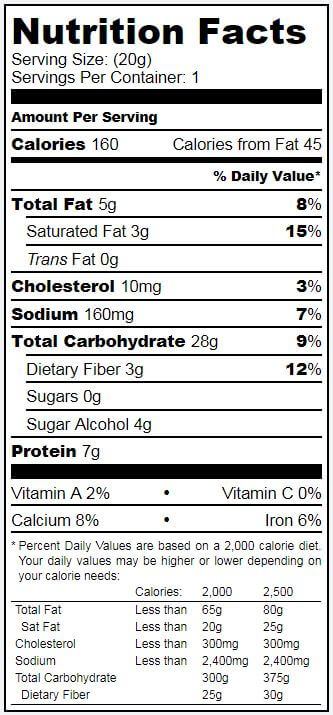What are Sugar Alcohols?

Sugar alcohols, known as polyols, appear as ingredients in many products labeled “sugar-free” or “no sugar added.” Sugar alcohols commonly seen on food labels are mannitol, sorbitol, xylitol, erythritol, and hydrogenated starch hydrolysates. Products often containing sugar alcohols are hard candy, chewing gum, baked goods, ice cream, and mouthwash.1-3
Sugar alcohols are not artificial non-nutritive sweeteners, but they are hypocaloric sweeteners that contain carbohydrate (about half the calories per gram found in sugar). Many people are under the false impression that foods with sugar alcohols are carbohydrate- or calorie-free.4 Although the general public may use sugar alcohols to reduce caloric intake, the evidence is inconclusive about the effectiveness of sugar alcohols in reducing body weight. More research is needed using large and more diverse samples.5
The American Diabetes Association’s latest recommendation regarding sugar alcohols is “For most people, it is not necessary to subtract the amount of …sugar alcohols from total carbohydrates when carbohydrate counting.”6 However, professional opinions vary, so patients should check with their health care providers about sugar alcohol and carbohydrate counting. Hope Warshaw, a nationally recognized registered dietitian and certified diabetes educator, reminds us that sugar alcohols are no panacea for those with diabetes and it is imperative that prevention experts help patients take a closer look at food labels.4
- Fitch, C., Keim, K. S., Academy of Nutrition and Dietetics. (2012). Position of the Academy of Nutrition and Dietetics: Use of nutritive and nonnutritive sweeteners. J Acad Nutr Diet, 112, 739-58. doi: 10.1016/j.jand.2012.03.009.
- Yale New Haven Health. Yale Hew Haven Hospital. (2017). Eat any Sugar Alcohols Lately? Retrieved on September 30, 2017 from https://www.ynhh.org/services/nutrition/sugar-alcohol.aspx
- Joslin Diabetes Center. Harvard Medical School. (2017). What Are Sugar Alcohols? Retrieved on September 30, 2017 from http://www.joslin.org/info/what_are_sugar_alcohols.html
- Washington Post. (2014). Wellness. Nutrition Q&A: Sugar alcohols are no panacea for diabetes
- 5Wiebe, N., Padwal, R., Field, C., Marks, S., Jacobs, R., Tonelli, M. (2011). A systematic review on the effect of sweeteners on glycemic response and clinically relevant outcomes. BMC Med, 9,123. doi: 10.1186/1741-7015-9-123.
- Evert, A. B., Boucher, J. L., Cypress, M., Dunbar, S. A., Franz, M. J., Mayer-Davis E. J., Neumiller, J. J., Nwankwo, R., Verdi, C. L., Urbanski, P., Yancy, W. S., American Diabetes Association. (2013). Nutrition therapy recommendations for the management of adults with diabetes. Diabetes Care, 36(11), 3821-3842. doi: 10.2337/dc13-2042.
